At the age of six Nadia Coma-neci's mother sent her to afternoon classes at a gymnastics school in her hometown of Ornesti, Romania, because Nadia was literally bouncing off the walls.
"My hyper-activeness was taking a toll on my mother's couches," she says, "so she thought gymnastics classes would drain some of my energy and give her furniture a break."
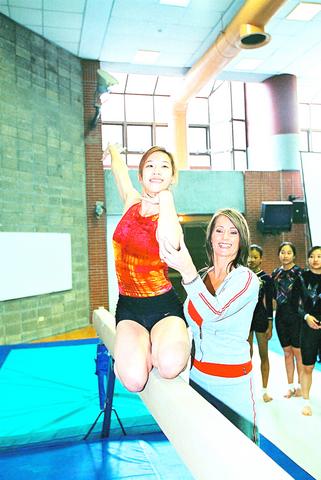
COURTESY OF DYNAMICS PR
Nadia soon started to like the classes, but she never thought it would lead to much more than afternoons of fun.
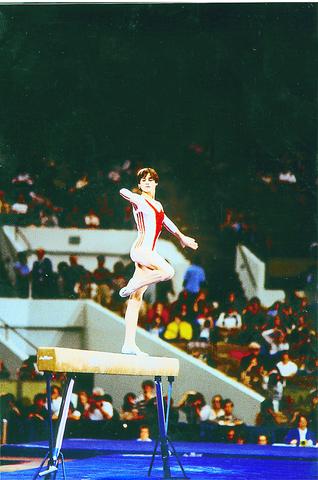
COURTESY OF DYNAMICS PR
"It felt very temporary. I liked it but I never thought that I had a future in it."
This is perhaps why, today, Nadia's first word of advice to anyone who wants to win a gold medal in gymnastics one day is "not to want it too much."
"When children start to do gymnastics, they must train only because they enjoy it and want to improve their skill. Children who do gymnastics only because they want to win gold one day are in for a lot of pain and disappointment. It's just too much of a long shot."
This may explain Nadia's perfect performances at high-level events. Perhaps the fact that she enjoyed what she was doing -- and therefore did not need so desperately to impress anyone -- helped her to avoid performance anxiety and stay calm during performances.
In her lifetime she managed to win three and two golds respectively at the two Olympics she competed in, in 1976 and 1980 in Moscow. In all, she won nine Olympic medals and cleaned up at the European and World Championships.
"It was very fortunate that my mother happened to choose gymnastics classes, if she chose anything else I doubt my life would have turned out the same."
But the young Nadia's fun-oriented view of her sport did not keep her from getting noticed by Romania's coaches. By word of mouth she gained the attention of Romania's sporting complex -- and the coaches were impressed by what they saw.
"After a while I sensed that I was learning things faster than others and started doing things others had difficulty with, but it was never as if I knew I was going to be a star."
At the age of 13 she competed in her first big competition, the European Championships in Norway. There she won three golds and "there the world found out about me" -- and thus the stage was set for Montreal.
When asked how those 1976 Olympics changed her life, Nadia replies: "Nothing!"
"I went back home, I got a big welcome and I went back to the gym -- and everything went pretty much as before."
Perhaps a big reason for this is the fact that Romania was a Communist-controlled satellite state of the USSR and the country was thus behind the Iron Curtain, its people controlled by an all-powerful government that chose where its heroes were seen -- and when.
The incredible thing about Nadia was that many Westerners, especially Americans, rooted for her at the Montreal Games and hoped she would beat even their own gymnasts, despite the fact that the West was at that time locked in a bitter cold war with Romania and her allies.
Because of her popularity in the West, she was considered to be a prime candidate for defection and, except for a brief, heavily supervised guest appearance at the 1984 Los Angeles Games, Nadia was rarely seen by the public after the 1980 Games.
With travel forbidden, she started coaching the sport she once dominated.
"But I didn't think it was fair to keep me from experiences and places I was invited to. Nobody could give me any reason why I was not allowed to travel. I felt trapped and I resented that."
In 1989 Nadia could no longer stand the restrictions. She decided to make use of the easing border tensions caused by glasnost to walk at night across the mountains into Hungary and from there into Austria -- a feat that took six hours to complete.
"From Austria I flew to New York and there I was contacted by a friend who worked at the Olympic Stadium in Montreal, so I went to live in Montreal. But he tragically died a year later in a diving accident. Then I asked other friends I had met in Montreal, Paul Ziert and Bart Conner -- who I also first met at the '76 Games -- `what should I do' I asked them, and they said: `pack up and come to Oklahoma,' and that's how I landed in Oklahoma."
Bart, also an Olympic-award-winning gymnast, and Paul were at that time working on the Bart Conner Gymnastics Academy in Norman, Oklahoma. Today the academy is one of the biggest in the US.
Nadia and Bart were married in 1996. Together they run the Bart Conner Academy and are also editors of International Gymnast magazine.
"But most of our work is on the road -- we fly a lot to different parts of the world to promote gymnastics and good causes," Nadia says.
"One of my favorite moments was when I introduced President Bush to my fellow Romanians just a few weeks ago."
Nadia accompanied Bush on the presidential balcony when he gave an historic speech to thousands of Romanians gathered in Bucharest's Revolution Square, just after NATO decided to give Romania membership.
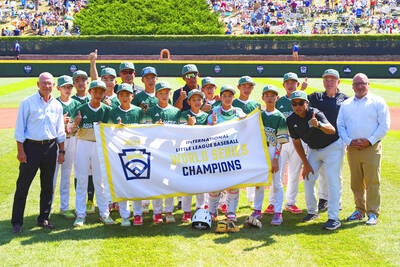
TO THE TOP: After securing the international title on Saturday, Team Taiwan were to face Las Vegas to potentially win their 18th Little League World Series championship A team from Taipei’s Dong Yuan Elementary School won the Little League Baseball World Series’ international title on Saturday by defeating Aruba 1-0 in the annual baseball tournament held in South Williamsport, Pennsylvania. The Taiwan team, competing under the name Chinese Taipei, were after press time last night to face a team from Las Vegas, Nevada, which beat a team from Fairfield, Connecticut, in the US championship 8-2. Taiwan are seeking to win their first Little League Baseball World Series title since 1996. “Really haven’t taken a moment to data dump right now on Taiwan,” Nevada manager T.J. Fescher said. “They’re a
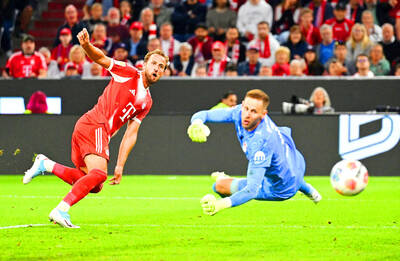
‘CATASTROPHE’: Despite losing several key forwards in the summer transfer window, Bayern were up 3-0 in the first half before Harry Kane scored a hat-trick in the second Harry Kane hit a hat-trick, Michael Olise a double and newcomer Luis Diaz also scored as Bayern Munich made a “statement” against RB Leipzig 6-0 at home in the Bundesliga season opener on Friday. Bayern’s big-money arrivals, all brought in from the Premier League across the past three seasons, were dominant as the Bavarians begun their title defense in style. Olise scored twice in the first half, either side of a Diaz strike. Not to be outdone, Kane scored three goals in the second half — with two assists coming from Diaz, to bring Bayern’s total to 6-0. Kane told the Bundesliga

Marc Marquez continued his winning streak as he cruised to victory in the Hungarian GP sprint by two seconds on Saturday night to pad his championship lead. It was a seventh straight Sprint victory for the Spaniard, who has also won the last six longer Sunday grand prix races on his factory Ducati. Fabio Di Giannantonio, an Italian with the VR46 Ducati satellite team was a distant second at Balaton Park, followed by his team-mate and compatriot Franco Morbidelli third. Marquez, a six-time world champion, started the race from pole position. “I felt someone really close on the first corner, from there I
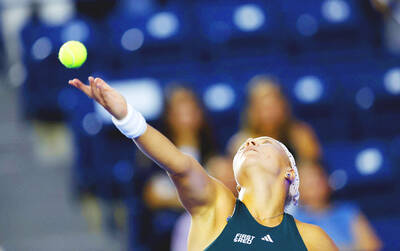
Russian Diana Shnaider continued her impressive winning streak in tour-level finals at the Monterrey Open on Saturday, beating compatriot Ekaterina Alexandrova 6-4, 4-6, 6-4 in the WTA 500 event’s final. Shnaider had little trouble in the opening set but struggled in a topsy-turvy second, as Alexandrova clinched the set’s fifth and decisive break at 5-4 to force a decider. Third-seed Shnaider carved out an advantage early on in the third set when she broke Alexandrova in the first game and held serve to go 2-0 up, an advantage she would not relinquish. World No. 12 Shnaider is now unbeaten in her last five